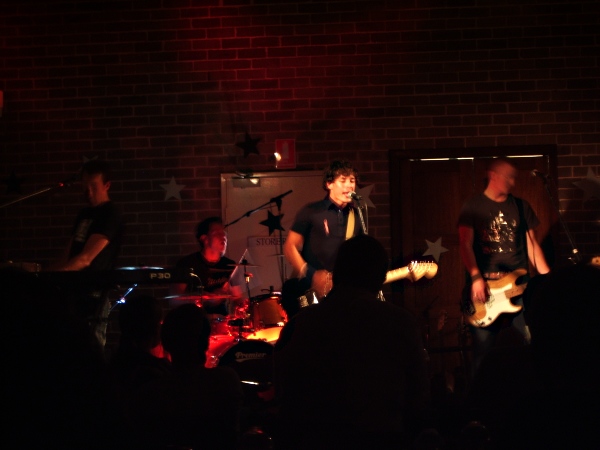24 Oct 2005
I’ve been talking with Ben this evening about… markup, amongst other things, and discovered a conviction that using single quotes with an attribute is evil.
Clearing this up right now: it’s not, either in HTML 4 or XHTML (which retains much of the semantics of HTML 4, except where explicitly contradicted — “The semantics of the elements and their attributes are defined in the W3C Recommendation for HTML 4. These semantics provide the foundation for future extensibility of XHTML.”). Section 3 of the HTML specification states:
By default, SGML requires that all attribute values be delimited using either double quotation marks (ASCII decimal 34) or single quotation marks (ASCII decimal 39). Single quote marks can be included within the attribute value when the value is delimited by double quote marks, and vice versa. Authors may also use numeric character references to represent double quotes (") and single quotes ('). For double quotes authors can also use the character entity reference ".
Ben didn’t quite get the “Single quote marks can be included within the attribute value when the value is delimited by double quote marks, and vice versa.” bit, so here’s a quick example of both:
<img alt="If you can see this, the image isn't working" />
<img alt='You can probably see this because the "src" attribute is not defined' />
Both are valid and should work fine (with the exception of the lack of src, obviously). Feel free to use single or double quote marks, safe in the knowledge neither is better than the other.
24 Oct 2005
Regretably, the location bar has been disposed of in the latest version of Nautilus, in favour of buttons to navigate to the present directory. This sucks. Especially when trying to access hidden folders quickly and easily. Today, I discovered it’s possible to use Ctrl + L to achieve the same thing, but I really don’t see why a series of buttons should be used to do what I could do before. In my case the buttons take more time, because I’m a keyboard person and mousing is, except for when very tired, a secondary action.
So I changed the default back to what it should have stayed as, following these instructions I found online. I say “should have stayed as” because the change introduces insurmountable barriers (e.g. navigating to hidden files/folders) to the user experience, in favour of a very dubious UI enhancement. Dictated not only by convention, but also practicality.
Furthering my irritation was the difficulty of changing it back. The steps described on the post I found aren’t particularly complex, but this is something that should be accessible via the Edit → Preferences menu within Nautilus itself: it is akin to show/hide hidden files, which is in there where it should be (also via Ctrl + H — but I consider this poorly implemented, too, as it requires a manual refresh of the page to restore initally-screwed up icon positioning).
24 Oct 2005
I had a dream last night where my house had a kinda different layout (but the contents were the same…, and all the computers were downstairs and the front opened up some more/had really cool glass doors. There were a few people around so I left the house with someone and went for a drive [in a 4WD, go figure… was most odd], not bothering to lock the doors because I figured other people were around and were going to stay there. I don’t actually remember who any of these people were, but meh :P
Anyway, we get back about half an hour later and there’s no-one there anymore, and someone has stolen two LCD screens (but left all the old ones — I felt bad because I hadn’t packed away the 19″ and 17″ boxes, so that made it quicker/easier for them to take stuff), as well as my computer (but no others… there’s probably no rational reason for this, aside from that it was my dream. Possibly because a few days back I’d been asked what one thing I would take out of my house if it was burning down, and I said my computer because it’s got a few years worth of photos, work, and music on it — and not all of those things are completely backed up offsite.)
In actual fact, I didn’t particularly care. Insurance would pay for the screens, and having to get a new computer meant not only that I didn’t have to worry about the inevitable bloat of my home directory (and my Desktop is a living example of chaos theory — I’ll clean it up, only to find it absolutely full three days later), but also that I could get an iBook instead! Yay!
Of course, none of this actually happened. But I was pleased to realise how little I’d actually care! And, for a few short moments, I was convinced I was going to get an iBook. Then I woke up.

23 Oct 2005
Last night at St Thomas’ in North Sydney there was a concert called “Freedom“. There were two acts, being Mike McCarthy and The View (pictured below), as well as a short talk on true freedom through Jesus.

Geek aside: They were using a Jands 4 PAKc and two sets of 4 pars on either side of stage, and it looked as though the op managed to get them to chase in pairs (even though they were paired on the dimmer by colour on either side of stage)… as in, 2×2 alternating rather than 1×1 alternating across the four channels. Was most bizarre. It’s a pretty neat console for small band things and other places where there’s no [convenient] access to 32A power, plus they’re painless to setup and transport. Oh, yeah, and if all you need is a couple of pars then there’s no excuse for spending more on a console and dimmer: these things are sub-$800AU.
22 Oct 2005
Last night we had our second “Cook Off” event, which involves a bunch of ingredients and four teams competing against each other to create something delicious edible.

I’ve uploaded a bunch of photos from the cook-off, so… go check them out. Credits to Sarah for… about half of the shots. I did the food macro ones. Also managed to accidentally over-write source images when copying, so the scaled images you see in the album are all I’ve got, sorry.


